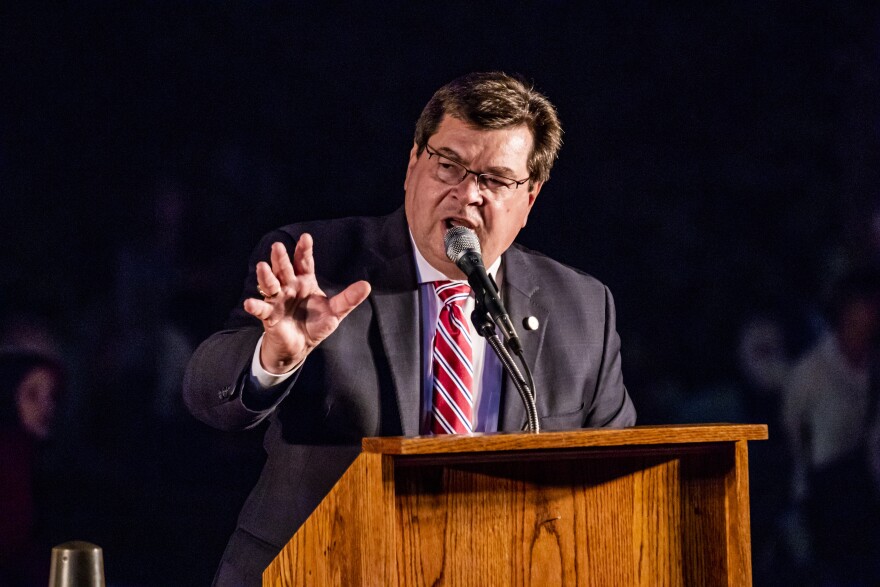Black student leaders pushed back Friday against the Illinois State University administration’s response to concerns about on-campus discrimination, calling it a “slap in the face” and demanding more protections from “antiblackness.”
Friday’s statement from the Black Homecoming Committee (BHC) and Student Government Association Sen. Kiana McClellan criticized a campuswide email sent Tuesday by ISU President Larry Dietz. He was responding to concerns about the treatment of minority-led student organizations like BHC and other microaggressions, culminating in an #AntiBlackISU rally Monday on the Quad.
In his email, Dietz promised to take students’ concerns seriously and invited them to meet with him and the Campus Climate Task Force. But Dietz and other ISU officials denied BHC’s claim about being unable to schedule a Homecoming event at Redbird Arena because of an ISU volleyball practice—a catalyzing event in the #AntiBlackISU movement that spilled into public view Oct. 4—calling it inaccurate.
“You emphasize how the campus works tirelessly to provide an inclusive and welcoming environment, yet you cannot claim inclusivity without denouncing racism and addressing the antiblackness that students are speaking out about,” BHC and McClellan said Friday. “In this letter you never address antiblackness or denounce racism. Yes, we have the diversity (in that) we are here, but we lack inclusivity. There are no structural or procedural things in place that protect us from antiblackness.”

Dietz and Vice President for Student Affairs Levester Johnson spoke to the Student Government Association (SGA) at a meeting Wednesday night. That meeting began with public comments from black students who claim to have experienced racism on campus. Friday’s statement recalled one such incident: A student working for Event Management, Dining, and Hospitality who says she was “threatened to get written up because she could not fit her natural hair into her campus dining hat.”
“At Illinois State University, to black students, diversity means antiblackness. Diversity means being micro-aggressed in the classroom. Diversity means students should shut up when they are being discriminated against. Diversity means that the administration ignores students' actual needs and they make us out to be dishonest about our experiences,” BHC and McClellan said in their statement.
They also pushed back at ISU’s official explanation for why the Black Homecoming Committee encountered problems scheduling the Oct. 25 event at Redbird Arena.
In a tweet thread Oct. 4, the BHC said it had “Redbird Arena solidified for a concert for which we submitted contracts for DJs, artists, bands, etc. Our reservation got cancelled on (Oct. 1) because of a last-minute volleyball practice.” BHC claimed they were discriminated against and are not as well-funded or supported as other ISU student groups, such as University Program Board (UPB).
ISU officials denied the event was canceled because of anything related to do with volleyball, pointing out that the team is out of town that weekend. They also said BHC never had a contract or agreement for Redbird Arena and that Athletics tried to make it work but couldn’t. Security was another consideration, they said.
“During discussions about a potential event, security concerns were raised, but these are security protocols that apply to the entire University—not just certain groups or individuals,” Dietz said in his email Tuesday.
“Complicating the issue was that the University first learned about the desired event less than two months before our annual Homecoming celebration,” Dietz added. “Most Homecoming events are planned up to a year in advance.”
In response, BHC and McClellan said security concerns were not brought up to BHC as an issue until late September or early October.
“As an unsponsored registered student organization we depend on program funding from the Dean of Students Office. The program fund does not give out allocations until mid-July, which doesn’t give (the) Black Homecoming Committee the same opportunity as organizations such as UPB to plan for events,” they wrote.
That issue was also cited in a list of seven demands provided by black student leaders to ISU administrators earlier this week.
“We want an organization that is culturally centered to minorities on campus, that is supported in the same way UPB and organizations alike are supported. Both in terms of finances and venues,” according to their list of demands.
ISU has made strides on diversity under Dietz’s tenure. He appointed the Campus Climate Task Force in 2016 to address the Campus Climate Assessment Report, which found students of color felt significantly underrepresented and undersupported. An implementation team has been working on short- and long-term suggestions stemming from that report, providing regular progress reports online and through the Identity newsletter.
The percentage of black students on campus has increased modestly under Dietz’s tenure, from 7.4% in 2015 to 8.8% last fall. In fall 2019, 32% of the freshman class came from traditionally underrepresented groups. Dietz also recently announced a new multicultural center will open by next fall on Main Street.
Meanwhile, the Bloomington-Normal branch of the NAACP issued a statement Thursday about the #AntiBlackISU movement. Chapter President Linda Foster, an ISU graduate, said “all students deserve a learning environment where they feel valued, safe, and included.”
“The community can rest assured that the local NAACP officers are working diligently to make certain action is taken to ensure an engaged and welcoming higher institution of learning,” Foster said.
People like you value experienced, knowledgeable and award-winning journalism that covers meaningful stories in Bloomington-Normal. To support more stories and interviews like this one, please consider making a contribution.


